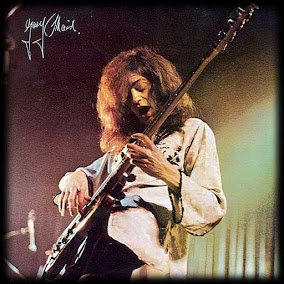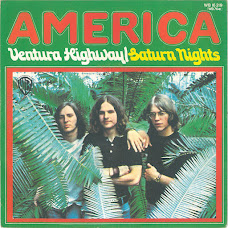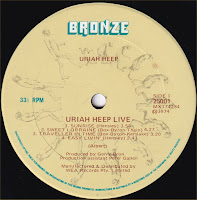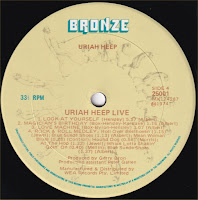Few groups have minted as much critical derision as Uriah Heep. This veteran British band's style includes elements of progressive rock, jazz, and even country but their essential nature was perfectly summed up by the UK title of their debut album. 'Very 'Eavy, Very 'umble' (1970). The album was eponymous in the United States, where it led Rolling Stone's Mellissa Mills to famous pronounce, "If this group makes it I'll have to commit suicide." Other writers have decided Uriah Heep as "The worst music I've ever heard in my life" and likened them to a foul odor.
Nonetheless, Heep - named after a character in Charles Dickens' David Copperfield - did indeed make it particularly with album 'Demons And Wizards', released in May 1972 and considered their masterpiece by those whose nostrils aren't so sensitive. 'Innocent Victim' came out in 1977, a period that saw the band temper their indulgences and even nod toward pop - which didn't stop another journo opining, "I've always loathed them and thought... Innocent Victim... was the nadir of a worthless career."
Since relegated to cult status in America and Britain, the band remain popular in Europe, Japan, and even Russia, where stadium shows are a regular proposition. All the discouraging words and innumerable line-up changes - guitarist Mick Box has been the only ever-present - haven't hobbled a band whose continued existence perhaps owes a debt to that shopworn saying, "Bad publicity beats none at all."
(by Ralph Heibutzki from 'Defining Moments in Music', Cassell Illustrated Publishers, 2007 p423)
(by Ralph Heibutzki from 'Defining Moments in Music', Cassell Illustrated Publishers, 2007 p423)
Ken Hensley Speaks about Demons And Wizards
I know I have said this before, but this is still one of my favourite albums and when people ask me that terrible question..."Which is your favourite Heep record?" I have to name it...along with a bunch of others, of course. Like most of the records I did with Heep, I can remember details of the sessions very clearly, such as David and I doing the choir parts for "Paradise/The Spell", spending hours and hours in a little booth in the studio while Gerry and Peter recorded, sub-mixed and re-recorded the parts.
I know I have said this before, but this is still one of my favourite albums and when people ask me that terrible question..."Which is your favourite Heep record?" I have to name it...along with a bunch of others, of course. Like most of the records I did with Heep, I can remember details of the sessions very clearly, such as David and I doing the choir parts for "Paradise/The Spell", spending hours and hours in a little booth in the studio while Gerry and Peter recorded, sub-mixed and re-recorded the parts.
It was always long, hard work, but the end result made it all worthwhile I think. I also remember not being told that the photographer was coming to shoot the inside shots which is why I have that feeble attempt at a beard in some of them, but let's not mention that. I still think it's the best of Roger's many great covers, but what I like about this record more than anything else is that itnall "fits"...if you know what I mean!! This was definitely a milestone in the band's musical history and it's nice to have a new slant and a fresh slant on it like this. Hope you enjoy it...again !
(Ken Hensley - February 2003)
Mick Box Speaks about Demons And Wizards
This was a really important album for us, as it really did put us on the world stage. It has since taken us to over 47 countries and with songs like Easy Livin', written by Ken, it made a huge impact and is requested everywhere we have travelled since its release. This album was our first visit into the world of fantasy lyrics and this seemed to capture everyone's imagination.
Along with the Roger Dean inspired artwork, we felt for the first time we really had the total package, with the music and artwork totally in synch. We felt on completion of this album a lot of excitement and that things were going to explode for us in a big way; this proved to be correct as we constantly toured places we had previously only dreamed of. This re-mastered CD version is a must for fans old and new and I am still very proud of it. (Mick Box, on tour in Germany, 23.09.95)
Regarded By Most As The Glittering Jewel
All these years later, the reasons why Demons And wizards became such an important and influential record are totally unmistakable - just play the bloody thing. Besides enhancing their growing status in the United States, songs like "The Wizard" and "Easy Livin", also turned Heep into superstars around the globe, including the UK where it spent 11 weeks, peaking at No.20.
Demons And Wizards was once again produced by Gerry Bron, whose growing importance within the Heep camp was mirroring the group's own fortunes. However, it also caused problems with their de facto manager, Paul Newton Senior. The bassist's father had worked long and hard on the fledgling act's behalf. It was Newton who'd invited Bron to check out his young charges at the Blues Loft in High Wycombe, though Bronze Records were only just beginning to see a financial return for their costly investment in studio time.
Regarded By Most As The Glittering Jewel
All these years later, the reasons why Demons And wizards became such an important and influential record are totally unmistakable - just play the bloody thing. Besides enhancing their growing status in the United States, songs like "The Wizard" and "Easy Livin", also turned Heep into superstars around the globe, including the UK where it spent 11 weeks, peaking at No.20.
Demons And Wizards was once again produced by Gerry Bron, whose growing importance within the Heep camp was mirroring the group's own fortunes. However, it also caused problems with their de facto manager, Paul Newton Senior. The bassist's father had worked long and hard on the fledgling act's behalf. It was Newton who'd invited Bron to check out his young charges at the Blues Loft in High Wycombe, though Bronze Records were only just beginning to see a financial return for their costly investment in studio time.
In Uriah Heep's crown, 'Demons And Wizards' was originally released back in May 1972. The quintet's fourth album transpired to be the cornerstone of their most commercially successful era, bringing them more Gold discs and maintaining the swift upward surge that had begun just seven months earlier with 'Look At yourself'.
The fall-out eventually cost both Newtons their roles in the band, and by the time that keyboard player/guitarist Ken Hensley, frontman David Byron and guitarist Mick Box returned to London's Lansdowne Studios for the Demons And Wizards sessions - their very first l6-track recordings - three further personnel changes had taken place.
The role of bassist briefly fell to Mark Clarke, though within just three months the ex- Colosseum/Tempest man had willingly stepped aside to accommodate New Zealand-born Gary Thain (see right). Clarke knew he was unsuited to Heep's non-stop workload - he later realised that he was on the verge of a nervous breakdown - though he sportingly agreed to stay on and teach former Keef Hartley four-stringer Thain the ropes during a US tour. Before he took his leave, Mark also had the honour of co-writing and singing a section of arguably the band's finest song, 'The Wizard', which was recorded as a single prior to the album.
"That one was written in the back of a van on our way to a gig," relates Box. "Kenny [Hensley] had his acoustic guitar out and we started playing around. Mark had an idea for the middle-eight. So he and Kenny went to the studio the next day and knocked down the riff, and it slotted in perfectly.
"Starting a song with an acoustic guitar was quite something in those days," Mick continues, before revealing another fascinating secret. "We had the studio door open, which led into the kitchen. While we were listening to the playback, this old fashioned kettle with a whistle went off. ln those days of peace and love, man, we thought the whistle sounded right with the track. So we recorded it and tracked it about six times, then varispeeded it to the right pitch. Not many people know that the high pitched note that sounds like a string note is actually the whistle of a kettle!"
Adds Clarke: "l'm also singing the part that goes, 'Why don't we listen to the voices in our hearts?' Dave Byron said, 'Does it have to be so high?' so Gerry Bron said, 'Why don't you sing it?' And that's what I did."
Once ensconced in the Heep ranks, Gary Thain proved to be a valuable new recruit. The likeable Kiwi could write good songs and his wandering bass lines added to the group's already enviable levels of musicianship, which were further enhanced still by the arrival of Lee Kerslake (see left).
Due to his loyalty to The National Head Band, the band's latest drummer had turned down previous overtures to join Heep. However, Lee knew Hensley (and Pau! Newton) via their shared days in The Gods, and from the moment Kerslake met the rest of the band at Jubilee Studios in November of 1971, he immediately became part of the furniture.
"Lee joining really steadied the ship musically," comments Box. "At last we were getting the right kind of people in."
The Album Cover
The album's fantasy-based sleeve was equally inspirational. Breaking with tradition, artist Roger Dean, who'd previously worked with Yes and Osibisa, was invited to hear Heep's new music before submitting his original gatefold illustration. lndeed, Hensley recently claimed that what Dean eventually delivered scarily matched a scene from a recurring dream he'd been experiencing at the time. "It wouldn't go away until one day I decided to write it down - after which I never had the dream again," he said.
'Demons And Wizards' was an odd cover for me because it was primarily painted with elements of collage, says Dean now. "The butterfly wings on the wizard are real butterfly wings. l'm still rather proud of it."
The Album
'Easy Livin", the album's second single, failed to trouble the British charts, though it turned out to be a monster hit in Holland, Germany and Scandinavia. Box recalls the track's legendary power- shuffle taking on a life of its own after "a pint or two" had been consumed in an adjacent public house, and it remains in Heep's live set to the present day, as well as a perennial highlight of Hensley's solo performances. In recent years, Demons And Wizards tracks like, "Circle Of Hands", "Rainbow Demon" and the "Paradise"/"The Spell" medley have all found their way back into the Heep repertoire, confirming the disc's profound and lasting appeal.
"The band was really focused," Hensley later remarked of the era. "We all wanted the same thing, we were all willing to make the same sacrifices to achieve it, and we were all very committed."
"Lee joining really steadied the ship musically," comments Box. "At last we were getting the right kind of people in."
The Album Cover
The album's fantasy-based sleeve was equally inspirational. Breaking with tradition, artist Roger Dean, who'd previously worked with Yes and Osibisa, was invited to hear Heep's new music before submitting his original gatefold illustration. lndeed, Hensley recently claimed that what Dean eventually delivered scarily matched a scene from a recurring dream he'd been experiencing at the time. "It wouldn't go away until one day I decided to write it down - after which I never had the dream again," he said.
'Demons And Wizards' was an odd cover for me because it was primarily painted with elements of collage, says Dean now. "The butterfly wings on the wizard are real butterfly wings. l'm still rather proud of it."
The Album
'Easy Livin", the album's second single, failed to trouble the British charts, though it turned out to be a monster hit in Holland, Germany and Scandinavia. Box recalls the track's legendary power- shuffle taking on a life of its own after "a pint or two" had been consumed in an adjacent public house, and it remains in Heep's live set to the present day, as well as a perennial highlight of Hensley's solo performances. In recent years, Demons And Wizards tracks like, "Circle Of Hands", "Rainbow Demon" and the "Paradise"/"The Spell" medley have all found their way back into the Heep repertoire, confirming the disc's profound and lasting appeal.
"The band was really focused," Hensley later remarked of the era. "We all wanted the same thing, we were all willing to make the same sacrifices to achieve it, and we were all very committed."
Heep had at last found a settled and fully motivated line-up, but they were rightly unhappy at being forced to rush their next album, 'The Magician's Birthday', into the shops just six months later. Indeed, as fruitful as the 'Demons And Wizards' sessions turned out to be, the busy days and nights spent at Lansdowne Studios in March and April of '72 weren't always what you'd call stress-free. If Uriah Heep had been an iceberg, then drug usage, alcohol dependence and inter-band squabbles
were busy eating away at them beneath the water's surface. Furthermore, their highly crucial relationship with Gerry Bron was turning sour.
"He never pooh-poohed any of our ideas [in the studio] at first, but later on he wasn't quite so good in that regard." Mick Box told me years later. "As instrumental as Gerry Bron was in building up Uriah Heep, he was equally guilty in bringing it down"
(Dave Ling writes for classic Rock magazine and is the author of the Uriah Heep book wizards)
were busy eating away at them beneath the water's surface. Furthermore, their highly crucial relationship with Gerry Bron was turning sour.
"He never pooh-poohed any of our ideas [in the studio] at first, but later on he wasn't quite so good in that regard." Mick Box told me years later. "As instrumental as Gerry Bron was in building up Uriah Heep, he was equally guilty in bringing it down"
(Dave Ling writes for classic Rock magazine and is the author of the Uriah Heep book wizards)
Bonus Tracks
10. WHY (Box/Byron/Hensley /Nemon) (10:34) - previously unreleased extended '72'version, EMI Music Publishing Ltd. 2003 Sanctuary Records Group Ltd.
10. WHY (Box/Byron/Hensley /Nemon) (10:34) - previously unreleased extended '72'version, EMI Music Publishing Ltd. 2003 Sanctuary Records Group Ltd.
A version of Why was recorded during the Look At Yourself sessions a year prior to this recording although that version had remained unreleased until 1993. Why had appeared as a B-side in 1972 in a number of countries and this was edited from a version recorded during the Demons And Wizards sessions. The full-blown track was unearthed in 1991 and several versions were mixed down. This extended version is probably the most exciting of the lot. There has been much debate as to whether this is Gary Thain! or Mark Clarke's stunning bass featured on this vastly underrated track. Laced with Mick fantastic guitar work (some of the best I have ever heard him do) and Ken's Hammond and Lee Kerslake's riveting drumming make this one of the best Heep tracks ever. The build up and climax to the ending is just pure seventies Heep. Stunning stuff, and it needs to be heard to be believed. This is a track that still knocks my socks off every time I listen to it! Play it for your
neighbours!
11. RAINBOW DEMON (Hensley) (3:36) - previously unreleased single edit. EMI Music Publishing Ltd. 2003 Sanctuary Records Group Ltd.
If this had ever been released as a single it would have made for interesting listening especially if it had ever got to 'Top of the Pops'.
12. PROUD WORDS ON A DUSTY SHELF (Hensley) (2:51) - Demons And Wizards out-take. EMI Music Publishing Ltd. 1995 Sanctuary Records Group Ltd.
Unearthed and mixed in 1991 this version of Prouds Words On A Dusty Shelf (or as Mick Box and Co. jokingly call it: 'Brown Turds On A Rusty Elf) was included previously on the 'Time O{ Revelation' box set. Several versions were recorded during the Demons and Wizards sessions but it was eventually Ken Hensley's debut solo project.
Unearthed and mixed in 1991 this version of Prouds Words On A Dusty Shelf (or as Mick Box and Co. jokingly call it: 'Brown Turds On A Rusty Elf) was included previously on the 'Time O{ Revelation' box set. Several versions were recorded during the Demons and Wizards sessions but it was eventually Ken Hensley's debut solo project.
13. HOME AGAIN TO YOU (copyright control) (5:36) previously unreleased version. EMI Music Publishing Ltd. 1995 Sanctuary Records Group Ltd.
Also located in 1991, several versions of this track existed on multi-track which does give some indication that the band were attempting to 'make it work'. A version of the track first appeared on the DW re-master from 1995.
14. GREEN EYE (copyright control) (3:46) - previously unreleased demo. EMI Music Publishing Ltd. 2003 Sanctuary Records Group Ltd.
Clearly only a demo that was recorded during the Demons And Wizards sessions, this track is certainly 'a heavy little Hammond number'. It is surprising this was not re-recorded at a later date, however it appears to have been forgotten. Although mixed in 1991, I then too forgot about it until Jeff Perkins who is currently writing a book on the life and times of David Byron visited me at home. He had requested to hear a few of the rare gems that we have tucked away that are still unreleased (yes, there are still a few more). Beer in hand (waving wildly, but not spilling the beer) he excitedly convinced me to include it on this remaster.
This post consists of FLACs ripped from my CD and includes album artwork for both vinyl and CD media, plus label scans. Having been collecting records for 50+ years, there are a handful of albums that I consider to be exceptional in my collection. 'Demons and Wizards' is one of them.
My older brother first introduced me to Uriah Heep when he would play his copy of Very 'Eavy, Very 'umble from his adjacent bedroom on a daily basis - I was 14 at the time. I was immediately mesmerized by the sounds I heard and eventually bought the album off him when he finally grew tired of it. I also acquired 'Look At Yourself' from him, but I still wanted more. So I visited my local K-Mart and luckily stumbled upon their latest release 'Demons and Wizards'. The Roger Dean album cover was a huge draw card and made the $5.99 purchase price even more attractive. Needless to say, I was 'blown away' by the sounds I heard when I first played the album. I literately played the album to death for the next 6 months until I discovered that the Heep had released a follow up album entitled 'The Magican's Birthday'.
Of course, this was the start of my life long relationship with Uriah Heep and I have acquired all of their vinyl releases to date.
I have decided to post a CD rip this time as my vinyl is somewhat tired and worn, and I want to ensure that you get a high quality recording. The bonus tracks have come from the expanded CD edition of the album, which was released 20 years ago. If you haven't heard this album before, then don't wait a second longer - download a copy and listen to this brilliant / ground breaking album. You won't be disappointed.
01 The Wizard 3:00
02 Traveller In Time 3:25
03 Easy Livin' 2:37
04 Poet's Justice 4:15
05 Circle Of Hands 6:25
06 Rainbow Demon 4:25
07 All My Life 2:44
08 Paradise 5:10
09 The Spell 7:31
Bonus Tracks:
10 Why (Previously Unreleased Extended Version) 10:34
11 Rainbow Demon (Previously Unreleased Single Edit) 3:36
12 Proud Words On A Dusty Shelf (Out-Take) 2:51
14 Green Eye (Demo - Previously Unreleased) 3:46
Uriah Heep were:
Vocals – David Byron
Bass – Gary Thain
Guitar – Mick Box
Keyboards, Guitar, Percussion – Ken Hensley
Drums, Percussion – Lee Kerslake
Demons and Wizards Link (480Mb)
Alternative Link (480Mb)





































































